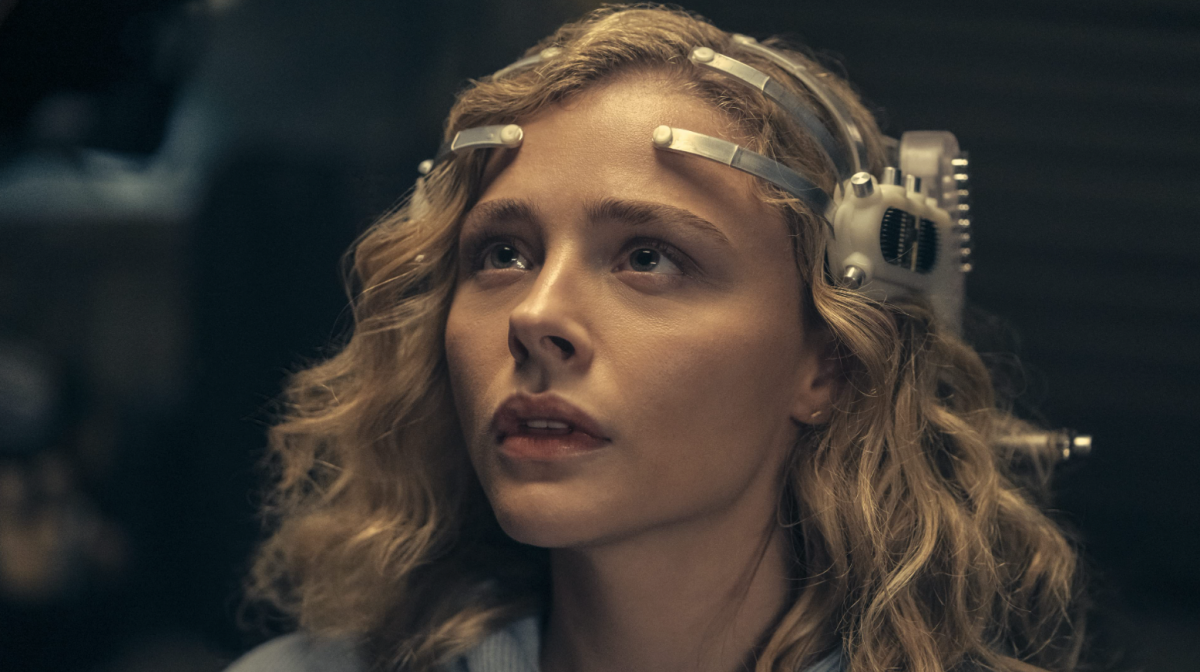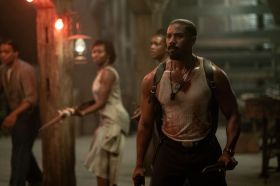William Gibson’s fingerprints are all over Hollywood’s futures. If he didn’t literally invent the internet with his first novel (1984’s Neuromancer), he was the first to come up with a version people actually wanted to use. Every virtual reality drama and online thriller owes him a debt: without him, there’d be no Matrix, no hacker heroes, and possibly no way for you to be reading this.
Over the decades, he’s been more a source of ideas to plunder than stories to adapt. The fun but flawed Johnny Mnemonic is his best known adaptation; Abel Ferrara’s New Rose Hotel is all but impossible to find. Now we have Amazon Prime’s The Peripheral (based on Gibson’s 2014 novel), the first attempt by Hollywood to go back to the source in a generation. Judging by the first few episodes, it’ll leave you wondering what took them so long.
The set-up
Flynne Fisher (Chloe Grace Moretz) lives in a small town in America’s rural south in the year 2032. She works in a copy shop (only the copies being made are 3D prints), takes care of her dying mother, and helps her Marine vet brother Burton (Jack Reynor) with his side hustle helping rich people level up in immersive video games. He might have the military experience but she’s the one with the gaming skills, so when he’s tapped to test out a new device that promises a next level experience, she’s the one who puts on the headgear.
What we know – and she quickly figures out; this is not a drama that tries to build tension by having characters lag behind the viewer – is that the virtual world she enters is in fact the future: London circa 2100 to be exact. Giant semi-statue buildings and weirdly depopulated streets give things a game-like feel, but while her first trip is a fun stealth mission (with a bit of romance mixed in), the second reveals the world she’s visiting has a very nasty edge.
Read: Los Espookys is queer and wonderfully weird
The set-up throws up a lot of questions, but the spine of the series is refreshingly straightforward. Flynne goes to the future, sees something she shouldn’t have, and now the future wants her dead. Other people in the future, most notably Wilf (Gary Carr), want to help her; their reasons are opaque. Sinister men fond of waistcoats are a constant across both timelines.
New twists
One of The Peripheral’s many tricks is serving up traditional science fiction tropes with a new twist. Yes, there are robots and time travel. Producers Jonathan Nolan and Lisa Joy give parts of this a sheen that could easily have come from their rival series Westworld.
But here the nature of time travel is that nothing physical can go, only data (which leads at one point to a moment referencing one of the more famous scenes from Neuromancer). So someone in the past can control a human-like robot body – a peripheral – in the future. Lacking such robots in the past, the future will have to make do with whoever they can hire on the dark web.
Fortunately, the America of 2032 isn’t exactly short of ex-military types looking for something to do. While the future is employing mercenaries from New Orleans, Burton has his buddies, who are all linked in a way that makes them a lethal fighting force even as they’re still just a bunch of messed-up veterans. Ten years from now, every male in rural America is either ex-military, a cop, or a drug dealer; seems like a reasonable prediction to make.
Read: Andor, Disney+ review: believe the hype, it’s amazing
It’s that level of (at times grimly comic) insight that has The Peripheral leaving most other TV SF looking like thin gruel. It’s not just that it’s bursting with ideas, though it is; you’re getting two futures for the price of one, and they’re both packed with the kind of small but society-changing concepts – lifted from real life, not things you’ve seen in other series – that build believable worlds. And if we’re not heading for these exact futures, the series has an explanation for that too.
It’s Gibson’s ideas that Hollywood loves, but his skill with characters is what puts this a step above their imitations. Flynne is in over her head but she’s smart and she adapts fast. Moretz gives her an inner glow whether she’s stressing out in her present or taking in the wonders of the future.
London’s residents are flawed and human even as distance renders them alien. The locals in 2032 remain down-to earth even as we can see the beginnings of the path they’re heading down. Burton’s team use drones as an integrated part of their combat missions, while the peripheral Flynne uses in the future is, looked at one way, just an extremely advanced form of drone.
The world of tomorrow leads to the world of next year. As the series develops, it becomes clear this is not a reassuring concept.
The Peripheral is on Amazon Prime Video from 21 October, with new episodes weekly.
Actors:
Director:
Format: Movie
Country:
Release:





